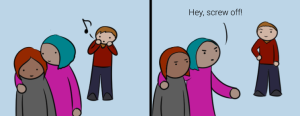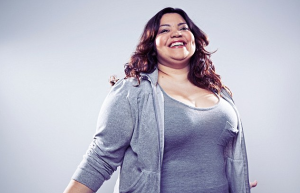 Source: Getty Images
Source: Getty Images
Here at my desk, I have a white board with article ideas on it. For some time now, staring down at me, have been the words: Are you raising a bully?
I wanted to write about the subtle ways that even the most conscientious parents might be raising a child to accept and partake in bullying behavior and unknowingly raising people who let bullying happen.
And then last month, I added to the board: “Steubenville, WTF?”
You see, I live an hour from Steubenville. I have family there. My dad was born there. More importantly, my high school was the major rival of Steubenville Big Red. To say that I grew up in a similar sports-idolatry-fueled entitlement culture would be an understatement.
I wasn’t sure I had anything new to add to the conversation, considering responses by, among others, fellow Ohioan Lisa Factora-Borchers and the always spot-on Laci Green.
And then my eyes strayed to my “raising a bully” idea.
Bystanders.
The word used to describe the Steubenville kids.
Dozens of kids at the party stood around while a sixteen-year old girl was repeatedly raped. Some of them were laughing; others were taking pictures and tweeting their thoughts.
To know that my child was a bystander, especially to such a heinous crime, would be devastating to me. I’ve taught my kids to stand up for themselves, and I hope that I’m never remiss in reminding them that they have an obligation to stand up for others, too.
Steubenville is a horrific example of the bystander effect. But what if your kid is a bystander to teasing, to name calling, to social ostracizing – behaviors that some refer to as “kids being kids?”
Have you addressed that? Are you sure you’ve modeled the proper way not to stand by?
With the horrific events of Steubenville as an extreme cautionary tale, let’s look at some ways parents might inadvertently be supporting bystanders:
1. Do You Use Bullying Behavior With Your Kids?
To bully is to use superior strength or influence to intimidate [someone], typically to force him or her to do what one wants (source).
I’d hope you aren’t using physical strength to intimidate your children, but what about using influence or power?
As a parent, you hold all the cards. Do you threaten your kids with your power? Do you say, “Clean your room or so help me…?” Or how about, “If you don’t do what I say, then I’ll take away your car/phone/allowance/etc.?”
These might seem tame (and even common place!), but ask yourself this: is this something you would say to your partner?
If my husband leaves his socks on the floor (again), would I say, “That’s it! No dinner for you tonight and give me your phone?” Probably not.
Hopefully that sounds silly to you. It certainly does to me. And furthermore, it probably wouldn’t work!
My husband would look at me like I had five heads and then would take his phone into the kitchen to make himself a sandwich.
I don’t have the power to manipulate him in this way. Instead, I need to engage in dialogue with him to have my needs met.
When we use our power to manipulate our kids into doing something, we are intimidating them and losing an opportunity to show them how a mutual relationship works.
As bell hooks says in her book All About Love: New Visions:
“There is nothing that creates more confusion about love in the minds and hearts of children than unkind and/or cruel punishment meted out by the grown-ups they have been taught they should love and respect.”
Bottom line? If we use bullying behavior with our kids, then we are saying that yes, there are some circumstances where it is appropriate to intimidate someone to get what you want.
Is that what we want them to learn?
2. Do You Use Bullying Behavior Toward Yourself?
Do you put yourself down? Punish yourself with diet or exercise? Call yourself names? Say you don’t deserve the people who love you?
Your kids are listening. Not only are you priming them to be bullied and to accept that disrespect, but also to accept mistreatment when they see it happening to others.
Make your home a name-calling-free space. Speak only love and encouragement of your kids and of yourself. Eat and move out of love, not punishment.
And talk to your kids about practicing self-care and prioritizing self-worth.
3. Do You Participate in Gossip?
Gossip is the bedfellow of bullying. Social aggression, like using social power such as popularity to ostracize others, is rampant in middle and high school. And, let’s face it; gossip still thrives in some workplaces.
Do you come home from work and unwind by telling your partner the “dirt” around the office? Now, I’m not saying you that can’t unwind. And your partner is your confidante to help you cope.
But your children, particularly if they’re young, aren’t going to separate what you’re saying as privileged communication.
Kids will hear that you are critical of the lives/fashion/mannerisms of others and think that is the norm. They will learn that trashing others is a way to feel better about yourselfIf you say that your boss is a slob who wouldn’t know a good idea if it sat on her, you might be right! But your child may not know that you are just blowing off steam and that you, in fact, treat her with the utmost respect in person.
I have neighbors that live near my parents, and I have always said that I hated them. Even now, when I’m moving away from disliking any human being or using words like “hate,” I still have a visceral reaction to these certain people.
And why? Because I grew up hearing my parents say how much of a snob/know-it-all/annoying person they were. It was probably just normal neighbor gripes, and my parents were likely just commiserating. My parents actually like this person.
But the small impressions that I got as a child are ingrained like a fingerprint in my psyche.
I say all of this to say: Your children are very impressionable and your opinion matters to them.
4. What About the Other Kind of Gossip?
You know, of the celebrity nature.
One area that I think the kindest person often loses their inhibitions is in what I call “celebrity cattiness.”
Do you know the sweetest person in the world that suddenly goes vicious talking about a Kardashian or the latest Housewife of Somewhere?
With the advent of reality TV, talking about our favorite TV shows is actually talking about real people! Sometimes I feel like this guy when I try to tell my friends on Facebook that we don’t know what that person’s life is really like.
If your pre-teens are sitting on the couch with you watching Dancing with the Stars and you are commenting on how big so-and-so’s butt looks or what an old bag what’s-his-name is, your kids are hearing you.
What are they absorbing about our right to comment on others’ bodies, words, actions, thoughts?
Call your girlfriend and talk about so-and-so if you must. Or better yet, just strip your life of negativity.
But make your home that name-calling-free zone even when talking to the people in the Box.
5. Are You Talking About Bullying?
If you aren’t talking about bullying, then you might be raising a bullying bystander. A vacuum is always filled with the worst-case scenario in parenting.
Never leave a vacuum.
If your child is in seventh grade or higher, you have to talk about what happened in Steubenville. They are hearing about it from their friends.
Regardless of gender, they need this conversation with their parents. Start here if you feel at a loss.
If your children are younger or not in school, you can decide if they need to know about what’s going on with the news.
Regardless, you have to openly, explicitly, and frequently talk about bullying.
What is bullying? How do we like to be treated? How would xyz make you feel? How do you think it makes others feel? What should we do if we see bullying? How should we treat the underdog? the bully?
Talk. Then talk some more. Let your kids go “Oh, Mom!” and roll their eyes when you bring it up because you bring it up. So. Damn. Much.
Because if they’re rolling their eyes at you, then just maybe they are going to remember the conversations when they’re at that party. In the basement. Bystanding.
—
For a great series of videos specifically about bystanders, check out this resource.
Want to know how to talk to your kids about Steubenville and other similar cases? Start here and here.
[do_widget id=”text-101″]
Want to discuss this further? Login to our online forum and start a post! If you’re not already registered as a forum user, please register first here.
Paige Lucas-Stannard is a Parenting Writer and Educator at Everyday Feminism. She’s a former NASA research librarian happy to be home raising her 3 IVF babies after nearly a decade of infertility. She blogs about infertility, parenting, and women’s issues at Baby Dust Diaries as well as being the founder of the gentle discipline site ParentingGently.com and co-founder of the breastfeeding rights site NursingFreedom.org. She likes to cook and sew and has, in general, become her mother. Happily. Follow her on Twitter @babydust. Read her articles here.
Search our 3000+ articles!
Read our articles about:
Our online racial justice training
Used by hundreds of universities, non-profits, and businesses.
Click to learn more





















